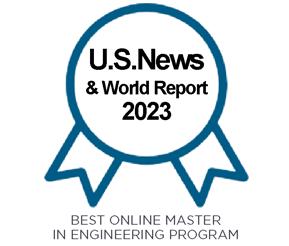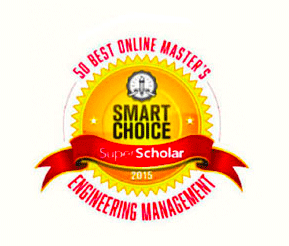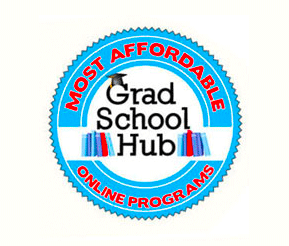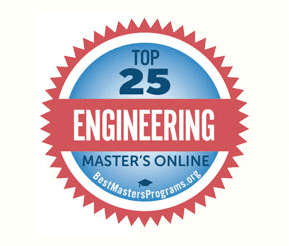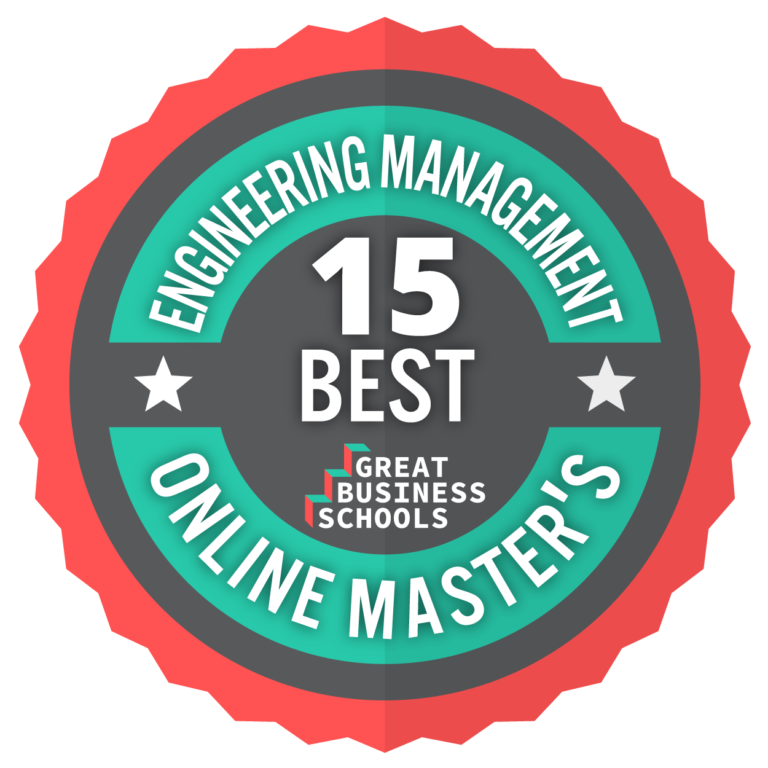Admission Requirements
Are the GRE or GMAT required for the master's degree or the graduate certificate?
The GRE or GMAT are NOT required. Your application will be reviewed on its own merits, even if you don't report a GRE or GMAT score. However, you are allowed to submit test scores as part of your application.
I understand that GRE score submission is not required for admission. If I do report my score, does that improve the likelihood of admission?
A strong GRE or GMAT score could help supplement an application.
My undergraduate degree is not in engineering. Can I still apply?
Consideration is given to those who do not have a traditional engineering degree, specifically those who have Science, Math, and Technology degrees. Students must meet our admission requirements to enter the Master's program or the Graduate Certificate. Please contact the MEM Program Coordinator if you have any questions.
Should I apply if my GPA is lower than a 3.00?
Through our holistic review process, GPA lower than 3.00 may be considered for admission on a case by case basis.
Why do you have a recommended two years of work experience before entering the program?
The origin of the MEM at UNL goes back to the early 1980s; it has a long history of being the preferred degree for working engineers. In the early '80s, electric utility companies in the State of Nebraska approached the university asking for a degree program that would provide a balanced combination of technical skills and business acumen to their engineers who possessed technical knowledge, but lacked professional, management, and leadership skills. At the time, the College of Engineering took on the challenge and started a program that has been transformed into today's MEM.
To date, the college has a great partnership with industry and employers not only in Nebraska, but across the nation. We pride ourselves on providing an important educational service to working professionals so they can gain the knowledge and skill sets that help develop them into being better engineers, managers, and leaders for their companies and their employers.
The superior quality of instruction and interactions that is possible in a class where learners have had on-the-job engineering experience is important to us and is a signature of our program. We value what this distinct population of learners bring to the table and contribute to the learning process, and also believe that the quality of our program, its learning outcomes, and learner experiences are unmatched because of it.
Do I need to provide transcripts for all schools attended or just for those schools I received a degree from?
- Your application will not be processed unless the Office of Graduate Studies receives transcripts from ALL institutions of higher education from which you received credit.
- This is true regardless of whether or not a degree was granted to you by that institution.
- Transcripts from ALL institutions are required: Colleges, Universities, Junior/Community Colleges, Technical Institutes, etc.
Must I provide Official Transcripts or Unofficial Transcripts?
- Unofficial transcripts are acceptable to receive conditional admission. With conditional admission students may enroll in classes for their first term.
- At the time of conditional admission, a registration hold will be placed on the students record for the subsequent term.
- Official transcripts are required and must be submitted to the Office of Graduate Studies by the following deadlines during the admission term.
- Fall: October 1
- Spring: February 1
- Summer: July 1
- An offer of admission will be revoked if all official transcripts and/or required documents are not received by the Office of Graduate Studies within specified deadline(s), or if discrepancies exist between official documents received and the copies uploaded by the applicant prior to the offer of admission.
What are "official" transcripts?
An official transcript is sent directly to us from the school you attended. Alternatively, we can accept official transcripts sent directly to you from the school, as long as the package remains unopened upon delivery to us.
Application
What is the application deadline for each semester?
Our program has rolling admission. If you meet all admission requirements, when your documents are submitted electronically and your application is complete and approved, you can enroll in classes offered in the next mini-session. There are five 8-week mini-sessions in a year: Fall A, Fall B, Spring A, Spring B, and Summer.
How long does the application process last?
A majority of the time that it takes to complete the application process is driven by and in control of the applicant who must submit the required documentation.
Generally, the part of the application process that takes the longest is the three recommendation letters supervisors and faculty must submit (two letters for the Graduate Certificate). This is because the applicant cannot control how long a recommender may take to complete and submit his/her letter.
We strongly suggest that you identify those individuals, notify them, and ask them to start composing their letters.
What must I submit in my application?
You should submit:
- Transcripts from ALL institutions of higher learning where you graduated or took any courses (even one). See note, below.
- Personal statement
- Updated resume
- Names and contact information for 3 recommenders.
They must each write/upload a letters of recommendation when contacted by the system.
Note:
At the time of application transcripts “can” be unofficial. In that case, admission will be conditional. With conditional admission you are eligible to enroll in classes during your first term. However, a hold will be placed on your registration to prevent you from enrollment in future terms.
Official transcripts must be submitted and received by the Graduate College during the first term you are admitted based on these deadlines, otherwise admission is rescinded and no credit will be given for any work completed.
Fall: October 1
Spring: February 1
Summer: July 1
Do I need to submit my resume in my application?
A current resume is required as part of your application. This helps us review your previous work experience.
Please include: previous education; previous and current employers; titles and work experiences; professional affiliations, involvement, and service; awards and honors; skills and certifications.
What are Requirements for Recommendation Letters?
- Three (3) letters are needed for admission to the MEM graduate degree. Two (2) letters are needed for admission to the Graduate Certificate program.
- Recommenders must be current or formers supervisors and managers (or in rare cases, faculty) with responsibility to evaluate your “professional” work and abilities.
- Family, personal friends, work friends, coworkers, etc. are not acceptable.
- Supervisors of work unrelated to engineering/technology are not acceptable.
- Family, personal friends, work friends, coworkers, etc. are not acceptable.
- Enter work email address and contact information for your recommenders when completing the application form. Do not provide personal email address such as: Gmail, Yahoo, Hotmail, Comcast, etc. When necessary to contact them, we would like to reach your recommenders in their work environment/space.
- Remind your recommenders:
- Letters must be written on company (or university) letterheads.
- Explain in what capacity they are writing the letter (present or past supervisor or professor), how long they knew you in that capacity and in which company (school), what their title was at the time of supervising you, and then include content about their knowledge and evaluation of your skills, abilities, motivation, projects you worked on, your performance, your impact, etc.
- We prefer all letters to come from professional contacts. An exception may be granted to recent graduates with limited number of supervisors, in which case we may accept one “academic” recommender (i.e., faculty).
- Once you apply and submit names of recommenders, the UNL system will contact them. At that time, they must acknowledge that they will act as your recommender, and then will receive information on how to submit/upload their recommendation and their letter.
- We highly recommend that you contact each of your recommenders before you submit your application. Explain to them your intention to list them as recommenders, secure their approval, ask them to start preparing their letters, and tell them to be on the lookout for communication they will receive via email from the University.
What should be included in my personal statement?
The personal statement is an opportunity to showcase who you are, why you want to enroll in the MEM program/certificate and why you believe the degree/certificate will help you in your career development and advancement.
Curriculum
What is Engineering Management?
Companies face technological challenges they must tackle to survive in a competitive global market. The need to integrate technical and business skills to overcome such challenges is imperative for organizational survival and success. The MEM program prepares you to do just that. Data-driven decision making is a distinguishing factor in the MEM curriculum.
Engineering Management (EM) as a discipline has its own unique body of knowledge (BOK) as promoted by the American Society for Engineering Management (ASEM). Between our MEM offerings in the College of Engineering and what you will take in the College of Business, you will have covered a great many of the topics in that body of knowledge and will be prepared to become a positive change agent in your organization.
Will the courses benefit my career development as a practicing engineer?
Our classes make an immediate impact on your career. Courses such as Decision & Risk Analysis, Quality Management using Six Sigma, Engineering Leadership, Engineering Law, Project Management, Teamwork for Organizational Commitment and Collaboration, Quantitative Analysis for Engr. Mgmt. Decision Making, and Strategy are all topics that are relevant, timely, and useful in an engineering work environment and for an engineering manager, or even an individual who works in the technical track. And, of course, topics such as finance, marketing, organizational behavior, or supply chain management can be taken from the business college.
What type of support I will receive if I pursue the MEM or the Graduate Certificate?
You will get personal attention as a student in our degree program or graduate certificate. Faculty and staff in engineering management and at the university care about student success and are ready to help. We recognize our students are working professionals with jobs, families, and obligations in addition to their school responsibilities. The same is true for all other offices with which you would interact, such as the library, graduate studies office, student accounts, registrar’s office, etc. Everyone is very professional, efficient, and ready to assist.
Do you allow transfer credits?
No transfer courses are allowed for the Graduate Certificate. However, it is possible to transfer up to six graduate credit hours (two courses) into the MEM degree program. This is not guaranteed, is reviewed on a case-by-case basis, and depends on the relevance of the course(s) to the MEM and to the applicant’s career path, the program and institution where the course(s) were completed, the year when the course(s) were completed, grade earned, etc.
Can I enroll in classes if I am missing courses required for admission to the program?
Knowledge of Probability and Statistics is needed in several courses. Therefore, if your transcript shows a deficiency in that course, you must complete that course before starting the MEM. Online options are available. Consult with the MEM director.
Is there a thesis or capstone course?
There is no thesis in the MEM program. The MEM is designed for engineers and technical professionals who work full time.
Do courses have prerequisites that may result in a graduation delay?
Most MEM courses do not have pre-requisites. Therefore, you are able to complete the degree in 2 years. As new courses are under development, you are encouraged to confirm with the MEM Program Coordinator or consult the Graduate Catalog website.
Delivery
Can you explain the cross-pollination opportunity?
Every student is an engineer or a technical professional with job experience in an engineering or technology environment. You will learn about their experience and perspectives, the engineering and business challenges they face, and their approach and response to addressing and resolving them. To exchange notes from other technical and engineering professionals who have relevant experiences from their organizations is a unique feature not offered by a business program or from many of the MEM programs across the nation that do not have a work-experience requirement to join.
Who teaches the MEM and Graduate Certificate courses and what is their experience in online education?
The faculty in both the engineering and business colleges have extensive experience with online education, course and program development, and teaching. They work closely with instructional designers to create courses that are interactive and interesting. All this makes for an engaging and rewarding learning environment and experience.
How are your online courses delivered?
This is an "online" program (not learning in isolation). Our instructors use various methods to deliver the content, transmit knowledge, and engage everyone in the learning process so the class is interesting and a positive experience.
- A very important method used is engaging the students in active discussion so learner-to-learner and faculty-to-learner interactions take place. Course discussion and interactions may be conducted in three ways:
a) Asynchronously, where you log in at your convenience (within the allocated time frame) to post messages, and read and respond to messages posted by the faculty and your peers.
b) Synchronously, where you log in to a live video-conference session to interact with the instructor and with your peers.
c) Both synchronously and asynchronously. We realize that students sign up for a 100% online program because of the flexibility of time and space it affords them. Therefore, if a course uses synchronous sessions, attendance is not mandatory and the session is often recorded for later viewing by those who could not join in real-time. The discussion is a great opportunity for cross-pollination of ideas and experiences. Current and past students report it to be one of their most positive and helpful experiences in the program. - Our instructors also create instructional videos to demonstrate hard-to-understand concepts, topics, and problems. The format and type of instructional video depends on the course subject. For example, in a course with subjective (qualitative) content, the instructor may share a video discussing the topic using PPT. But, in a course that includes problem-solving, the instructor may capture video of the solution process by writing all steps down or creating a diagram, by demonstrating software or interpreting output results. You may play the instructional videos at your conveniece at anytime, which is YOUR study time.
- Projects are often practical and students are generally encouraged to choose a work-related problem or issue to explore, study, and solve by applying skills and knowlege gained from the course.
- Some classes may have assignments that are completed in teams; this is very useful because virtual teams are becoming almost a standard practice in industry, and learning how to effectively participate in or lead such a team is quite advantageous.
- Depending on course topic, other relevant resources may be used to transmit knowledge and facilitate impactful learninig, such as Online Applets, TED Talks, Documentary videos, Blogs, etc., that are fully integrated into the course.
What is a typical class structure like (time, frequency, etc.)?
In line with the promise of flexibility of time and space that comes with a 100% online program, almost all activities are asynchronous and completed through our Learning Management System (LMS), which is Canvas. Courses have several modules, with timelines around each module with set due dates. However, you may complete the assignments within the timeframe alotted to the module.
Is the program flexible for those who travel for work?
The MEM Degree and the Graduate Certificate can be completed 100% online and are designed with the working professional in mind.
The flexibility in the coursework allows students to complete their assignments on their schedule and from any place in the world.
How many hours per week am I expected to study for a class?
It varies somewhat from course to course, but on average, you must study approximately 10 hours per week per class.
General
Is this a part-time or full-time program?
The MEM degree and graduate certificate are designed to meet the needs of working professionals. Most students who enroll in our courses are full-time employed and part-time students. They take one course at a time in each eight-week mini-session. Full-time students are welcome to enroll, but must have work experience.
Is this an on-campus program or only available online?
The Master of Engineering Management (MEM) degree program and the Graduate Certificate in Engineering Management are only offered 100% online, in eight-week asynchronous sessions. Work experience is required to join both and almost all of our students are working professionals who are geographically disbursed. Our online courses and structure are designed to meet the needs of these working professionals.
Can I complete the MEM degree or the Graduate Certificate outside of the United States?
Our online degree program and online graduate certificate allow students to complete their degree and certificate coursework from anywhere in the world as long as you have a reliable, high-speed internet connection.
How long does it take to complete the MEM degree?
The MEM program can be finished in two years if students take consecutive eight-week classes (Fall-A, Fall-B, Spring-A, Spring-B, Summer). That’s five classes in year 1 and five classes in year 2, for a total of 10 courses. But, we expect our students to complete the program in about three years, which is the average time to completion for the MEM. This is because some individuals may skip a term each year or during summer.
This is a really good time-to-graduation for a professional master’s degree and is indicative of the nature of the program and its flexibility, good design, and recognition of the work-school-life balance to meet the needs of working professionals.
Is there a time limit to complete the MEM degree?
Once you earn a graduate credit hour at UNL, it expires in 10 years. You are able to complete the degree in two years, but most individuals complete it in 2.5 to three years because of work, family, and life issues.
How does the MEM degree compare to the MBA?
- Most MBA programs do not have a restriction on the undergraduate degree earned. MBA students can come from all kinds of undergraduate backgrounds. The MEM requires undergraduate degree in Engineering or a quantitative discipline (STEM).
- While only about 27% of MBA graduates work in engineering and technology, more than 90% of MEM graduates work in engineering and technology firms.
- MBA courses and curriculum take into account the wide background of students who pursue that degree. Therefore, MBA curriculum addresses general business and administration foundations. In contrast, MEM focuses on management and technical skills needed in engineering and technology organizations. For instance, MEM courses use engineering and technical examples and case studies while those in MBA are general and could be related to service, retail, or any other type of industry. The MEM offers unique and relevant courses on the principles of technical project management, manufacturing and technology strategy.
- Our MEM requires work experience, whereas the MBA does not. This makes a considerable difference in the quality of interactions and instruction in the MEM because these working engineers bring with them examples, challenges, and experiences relevant to engineering and technology organizations. For that reason, the cross-pollination opportunity in the MEM is phenomenal.
- Recently, certain companies and managers only approve tuition reimbursement for their engineers and technical employees to earn the MEM degree or a technical engineering degree (rather than an MBA) because the curriculum, assignments, and learning outcomes for the MEM are more aligned with what engineering and technology organizations need and demand (examples reported to us through our students are: Boeing in Washington and Motorola in Shaumburg, IL).
Do I enroll in one class at a time?
A typical MEM student will enroll in one class per eight-week mini-session. This equates to two courses (six credit hours per semester) as there are two eight-week mini-sessions in one semester.
Must I take courses consecutively?
There is a lot of flexibility in the program so missing an eight-week session or a semester would not have a significant impact on your degree completion. If a student does not enroll in classes for 3 consecutive semesters, then they must apply again to the program.
You are encouraged to take courses consecutively and without interruption to keep the momentum going in your studies with a goal for degree completion in two years.
International Applicants
Does the MEM Program or Graduate Certificate offer a visa or residency?
Our MEM Degree and Graduate Certificate are considered distance programs. Hence, it is not possible to obtain a visa to study in the U.S. when enrolled in these offerings.
I have already taken the TOEFL and IELTS. Do those scores expire?
TOEFL and IELTS scores expire after two years. If you took the test more than two years ago, you would need to take it again and submit the score as part of your application
English is not my native language. Do I need to submit a TOEFL or IELTS?
- If your native language is not English, you must demonstrate English proficiency using one of the following tests:
- Test of English as a Foreign Language (TOEFL) score of at least 550 on the paper-based TOEFL; 79 on the Internet-based TOEFL, or
- International English Language Testing System (IELTS) overall band score of at least 6.5.
- Language proficiency requirement may be waived for individuals whose native language is not English, if they have:
- earned a college degree in the USA, or
- language of instruction was English for their college degree in their home country, and they have documented history of relevant employment (in engineering and technology industry) in the USA
Please note:
- This is an online degree program. It is not possible to obtain a Visa to study in the U.S. when enrolled in our program.
- This is a professional master’s degree. We are unable to offer teaching or research assistantships, internship, or other forms of support. A majority of our students receive tuition reimbursement from their employers.
Program Structure
Can I take a break from classes?
Students may take time away from the Program or the Graduate Certificate. This time away is typically an eight-week mini-session or could even be a semester.
Note: UNL course credits expire after 10 years. Therefore you must complete all requirements within 10 years of enrolling in your first class.
Note: If a student does not enroll in 3 consecutive semesters, they will be blocked from enrolling and must officially apply again to the MEM to continue their program of study.
Can I earn the Engineering Management Certificate and then use the course credits toward the MEM degree?
Yes, once you earn your Graduate Certificate, if you desire to earn the MEM degree, you must apply for admission to the MEM.
If admitted, the 12 hours from the Engineering Management Certificate can be rolled into the MEM degree program.
Note: most admission requirements are similar for the MEM and the Graduate Certificate. However, the MEM program requires 3.00 GPA (instead of 2.75) and 3 reference letters (instead of 2).
Tuition and Cost
What are the tuition rates and the overall cost?
The cost is flat and the same for in-state, out-of-state, and international students. We partner with the College of Business, which has the same tuition rate for courses you may take with them. Their courses are also online and eight weeks long.
- Application fee is $50 (waived for military personnel).
- Graduation fee is $25.
Visit this page for details of tuition and fees: /mem/tuition-and-fees/
Can I apply for financial aid?
U.S. citizens and permanent residents may be eligible to apply for federal financial aid benefits. Find out more information about applying for financial aid: https://financialaid.unl.edu/
Is there a discount for veterans and active duty military personnel?
Veterans and active-duty military personnel are eligible for a 15% online course tuition discount: /mem/military/
Are there any scholarships and or research opportunities that could save me some money?
The program does not offer any assistantships or scholarships. The MEM is a professional degree rather than a research degree; almost all of our students are employed and receive tuition reimbursement from their employers.
